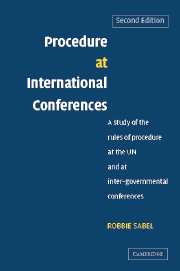 Procedure at International Conferences
Procedure at International Conferences Book contents
- Frontmatter
- Contents
- Preface to the second edition
- List of abbreviations and conference references
- Introduction
- 1 Historical development of rules of procedure of conferences and attempts to establish model rules
- 2 Adoption of rules of procedure
- 3 Rules of procedure and international law
- 4 Invitations, participation and credentials
- 5 Presiding officer and other officers of the conference
- 6 Meetings
- 7 Statements by delegations
- 8 Submission of proposals
- 9 Adjournment and closure of debate
- 10 Amendments
- 11 Withdrawal and reconsideration of motions
- 12 Procedural motions and points of order
- 13 Priorities between different proposals
- 14 Decision taking and method of voting
- 15 Majority required
- 16 Consensus
- 17 Separate votes
- 18 Conduct of voting – interruption of voting and correction of vote
- 19 Languages, records and documents
- 20 Committees
- 21 Suspension and amendment of rules of procedure
- Bibliography
- Index
4 - Invitations, participation and credentials
Published online by Cambridge University Press: 22 July 2009
- Frontmatter
- Contents
- Preface to the second edition
- List of abbreviations and conference references
- Introduction
- 1 Historical development of rules of procedure of conferences and attempts to establish model rules
- 2 Adoption of rules of procedure
- 3 Rules of procedure and international law
- 4 Invitations, participation and credentials
- 5 Presiding officer and other officers of the conference
- 6 Meetings
- 7 Statements by delegations
- 8 Submission of proposals
- 9 Adjournment and closure of debate
- 10 Amendments
- 11 Withdrawal and reconsideration of motions
- 12 Procedural motions and points of order
- 13 Priorities between different proposals
- 14 Decision taking and method of voting
- 15 Majority required
- 16 Consensus
- 17 Separate votes
- 18 Conduct of voting – interruption of voting and correction of vote
- 19 Languages, records and documents
- 20 Committees
- 21 Suspension and amendment of rules of procedure
- Bibliography
- Index
Summary
Invitation and participation
Who issues the invitations?
In his classic book on the Congress of Vienna, Harold Nicolson writes that: ‘The first two problems which face any international Conference are “Who is to issue the invitations?” and “Who is to be invited?”.’
Where an individual State convenes a conference, it is that State which issues the invitations. Nowadays however, most conferences are convened by the UN or by other international organisations and it is these organisations that issue the invitations. The European Community has also convened UN conferences.
Participation of States
Law-making conferences are open to participation by all States. The only recent exception was the 1997 Oslo Mine Ban Conference where participation was limited to those States that had agreed in advance to the principles of the anti-personnel mine ban, set out in the ‘Brussels Declaration’.
An early application of the principle of universality concerned the invitations issued to the 1899 Hague Peace Conference, which were addressed to the representatives of all the Powers of Europe, America and Asia represented at St Petersburg. Issuing such invitations was intended to allow what was regarded at the time as universal participation. During the early years of the UN, the criterion for invitation to conferences was the so-called ‘1949 Vienna’ formula, namely inviting States that were members of the UN, or of a UN specialised agency, or parties to the Statute of the International Court of Justice.
- Type
- Chapter
- Information
- Procedure at International ConferencesA Study of the Rules of Procedure at the UN and at Inter-governmental Conferences, pp. 51 - 67Publisher: Cambridge University PressPrint publication year: 2006


